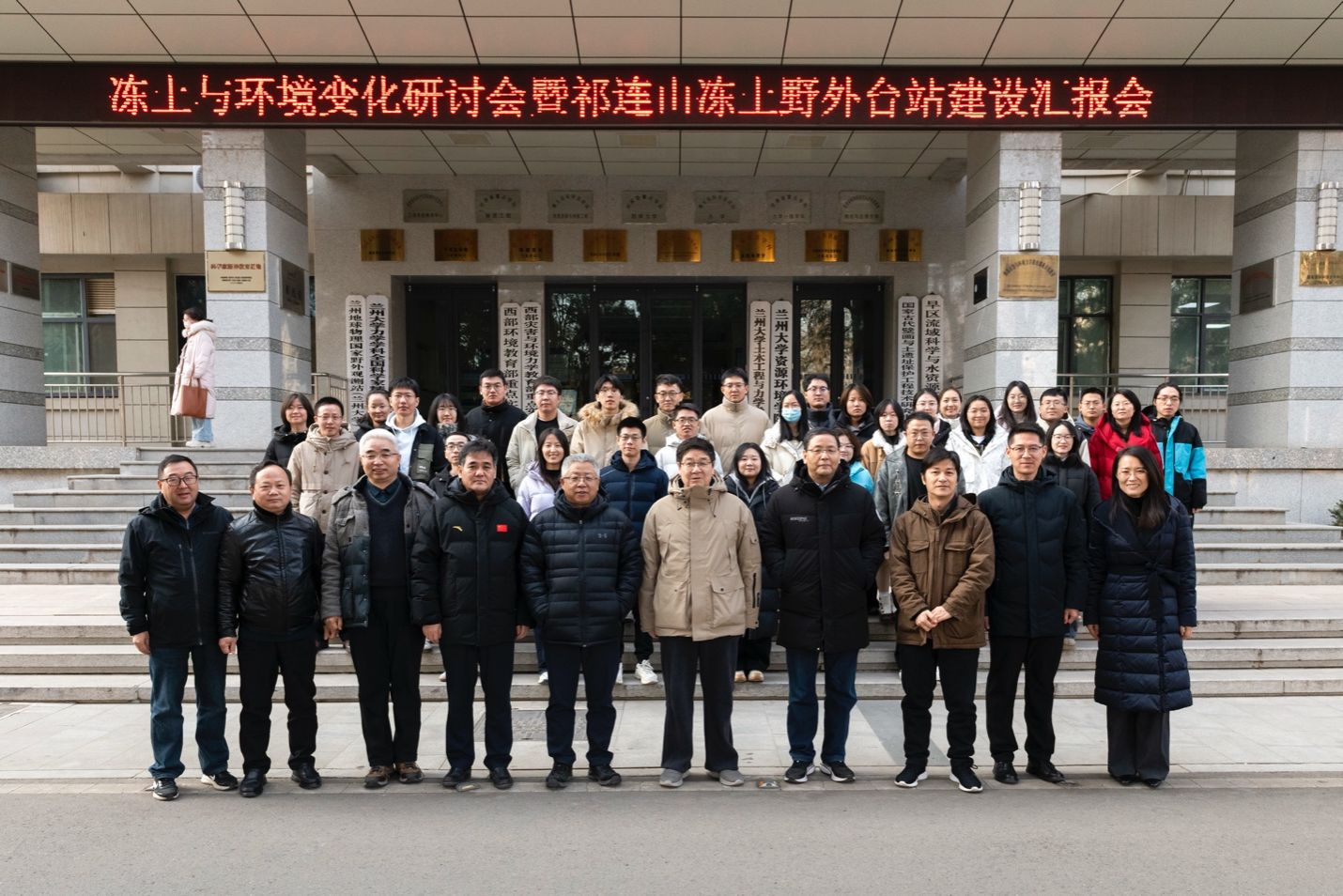The Seminar on Permafrost and Environmental Changes & Qilian Mountain Permafrost Field Station Construction Report was successfully held on the morning of December 27 in Room 502 of Qilian Hall at Lanzhou University. More than 50 experts and graduate students from institutions including the Northwest Institute of Eco-Environment and Resources, Chinese Academy of Sciences, Sichuan University, Nanjing University of Information Science and Technology, Northeast Forestry University, Nanjing Normal University, Shanghai Normal University, and Lanzhou University participated in the seminar.
The opening ceremony was chaired by Professor Cui Cui Mu from theSchool of Earth and Environmental Sciences. Attending the event were Zhaoping Wang, Director of the Research Institute for Science and Technology Development of Lanzhou University;Changming Zhao, Director of the Scientific Observation Station Management Center of Lanzhou University; andQingyu Guan, Vice Dean of the School of Earth and Environmental Sciences. The university leaders extended a warm welcome to the participating experts, expressing their gratitude for their support of the school, the faculty, and the development of the Qilian Mountain Field Station.

The morning session was moderated byVice Dean Qingyu Guanand featured several academic reports.Researcher Genxu Wang from Sichuan University delivered a presentation titled"Spatiotemporal Patterns, Driving Mechanisms, and Simulation of River Water-Sediment Processes on the Qinghai-Tibet Plateau."He provided an in-depth analysis of the dynamic changes in water and sediment processes in typical river basins, the spatial and temporal variations in sediment transport, the impact of sediment connectivity on river sediment transport, key driving factors of these changes, and the development and application of hydrological models in cold regions.

Professor Lin Zhao from Nanjing University of Information Science and Technology presented a report on"Water Resource Effects of Permafrost Changes on the Qinghai-Tibet Plateau."His presentation focused on the impact of permafrost thermal conditions on water resources, providing detailed insights into permafrost thermal states, underground ice distribution, quantitative evaluation of surface subsidence, and the effects of underground ice melting.

Professor Zhuotong Nan from Nanjing Normal Universitydelivered a report titled"Simulation of Permafrost Soil Water Dynamics Using Physical Models and Neural Networks."Addressing the challenges in permafrost hydrothermal modeling, he introduced a novel neural network-based approach that enhances the spatial transferability of soil hydraulic parameters, significantly improving the accuracy of permafrost soil water simulations.

In addition, several young researchers and students presented their latest findings.Guofei Zhang, a young researcher from Lanzhou University, shared research on"Spatiotemporal Evolution Simulation of Carbon and Water Processes in Alpine Ecosystems under Permafrost Degradation in the Source Region of the Yellow River."Chengyan Fan, a doctoral student, introduced his research on"Optimization of InSAR Technology in Permafrost Areas: Phase Unwrapping Error Correction and Deformation Time-Series Model Improvement."Mei Mu, a doctoral student, presented a report on"The Impact of Thermokarst Pond Drainage on Methane Cycling Processes."
The afternoon session was chaired byResearcher Yongjian Dingand included thematic reports.Professor Cui Cui Muprovided an overview of the Qilian Mountain Permafrost and Ecological Environment Field Observation and Research Station, highlighting research progress in permafrost changes and their environmental effects, permafrost thermal erosion disasters, permafrost carbon processes and regulation, and cryosphere changes in relation to sustainable development. She then delivered a report titled"Permafrost Carbon Processes: Responses and Regulation under Climate Warming,"explaining the impact mechanisms of thermokarst on rapid carbon release, the response mechanisms of in-situ decomposition and carbon release under warming, and the carbon budget changes induced by permafrost degradation.Professor Xiaoqing Pengpresented a report on"Permafrost Changes and Their Environmental Effects,"introducing research findings on the temperature sensitivity of permafrost changes through high-precision permafrost data products, new insights into ice-carbon coupling in permafrost regulation, and the first quantification of the contributions of climate, snow cover, and permafrost to vegetation greening in the Northern Hemisphere permafrost region.
Participating experts engaged in in-depth discussions on various topics. Regarding field station development, experts suggested further clarifying the station’s positioning, strengthening cooperation with local governments, improving monitoring systems for key environmental factors such as water, soil, atmosphere, and biology, and deepening research on underlying mechanisms. Additionally, they recommended establishing a dedicated deputy station director position, forming an academic committee, and enhancing the station's management system.

The successful convening of this seminar has fostered academic exchange in the field of permafrost science and will play a significant role in advancing the construction and development of the Qilian Mountain Permafrost Field Station.